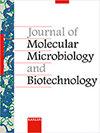Anaerobic Degradation of p-Alkylated Benzoates and Toluenes
IF 1.2
Q2 Biochemistry, Genetics and Molecular Biology
引用次数: 11
Abstract
The anaerobic degradation of 4-alkylbenzoates and 4-alkyltoluenes is to date a rarely reported microbial capacity. The newly isolated Alphaproteobacterium Magnetospirillum sp. strain pMbN1 represents the first pure culture demonstrated to degrade 4-methylbenzoate completely to CO2 in a process coupled to denitrification. Differential proteogenomic studies in conjunction with targeted metabolite analyses and enzyme activity measurements elucidated a specific 4-methylbenzoyl-coenzyme A (CoA) pathway in this bacterium alongside the classical central benzoyl-CoA pathway. Whilst these two pathways are analogous, in the former the p-methyl group is retained and its 4-methylbenzoyl-CoA reductase (MbrCBAD) is phylogenetically distinct from the archetypical class I benzoyl-CoA reductase (BcrCBAD). Subsequent global regulatory studies on strain pMbN1 grown with binary or ternary substrate mixtures revealed benzoate to repress the anaerobic utilization of 4-methylbenzoate and succinate. The shared nutritional property of betaproteobacterial ‘Aromatoleum aromaticum' pCyN1 and Thauera sp. strain pCyN2 is the anaerobic degradation of the plant-derived hydrocarbon p-cymene (4-isopropyltoluene) coupled to denitrification. Notably, the two strains employ two different peripheral pathways for the conversion of p-cymene to 4-isopropylbenzoyl-CoA as the possible first common intermediate. In ‘A. aromaticum' pCyN1 a putative p-cymene dehydrogenase (CmdABC) is proposed to hydroxylate the benzylic methyl group, which is subsequently further oxidized to the CoA-thioester. In contrast, Thauera sp. strain pCyN2 employs a reaction sequence analogous to the known anaerobic toluene pathway, involving a distinct branching (4-isopropylbenzyl)succinate synthase (IbsABCDEF).对烷基苯甲酸酯和甲苯的厌氧降解
4-烷基苯甲酸酯和4-烷基甲苯的厌氧降解是迄今为止很少报道的微生物能力。新分离的Alphaproteobacterium Magnetospirillum sp.菌株pMbN1是第一个被证明在反硝化过程中将4-甲基苯甲酸盐完全降解为二氧化碳的纯培养物。结合靶向代谢物分析和酶活性测量的差异蛋白质基因组学研究阐明了该细菌中特定的4-甲基苯甲酰辅酶a (CoA)途径,以及经典的中央苯甲酰辅酶a途径。虽然这两种途径是类似的,但在前者中,对甲基被保留,其4-甲基苯甲酰辅酶a还原酶(MbrCBAD)在系统发育上不同于典型的I类苯甲酰辅酶a还原酶(BcrCBAD)。随后的全球调控研究表明,苯甲酸酯可以抑制4-甲基苯甲酸酯和琥珀酸盐的厌氧利用。betaproteobacterium ' Aromatoleum aromaticum' pcy1和Thauera sp. strain pcy2的共同营养特性是厌氧降解植物源烃类对花香烃(4-异丙基甲苯)并进行反硝化。值得注意的是,这两种菌株采用两种不同的外周途径将对花香烃转化为4-异丙基苯甲酰辅酶a,作为可能的第一共同中间体。在的。芳香烃pcy1是一种假定的对伞花烃脱氢酶(CmdABC),它将苯基甲基羟基化,随后进一步氧化为辅酶a硫酯。相比之下,Thauera sp.菌株pCyN2采用类似于已知厌氧甲苯途径的反应序列,涉及不同的分支(4-异丙基苄基)琥珀酸合成酶(IbsABCDEF)。
本文章由计算机程序翻译,如有差异,请以英文原文为准。
求助全文
约1分钟内获得全文
求助全文
来源期刊

Journal of Molecular Microbiology and Biotechnology
生物-生物工程与应用微生物
CiteScore
3.90
自引率
0.00%
发文量
0
审稿时长
>12 weeks
期刊介绍:
We are entering a new and exciting era of microbiological study and application. Recent advances in the now established disciplines of genomics, proteomics and bioinformatics, together with extensive cooperation between academic and industrial concerns have brought about an integration of basic and applied microbiology as never before.
 求助内容:
求助内容: 应助结果提醒方式:
应助结果提醒方式:


